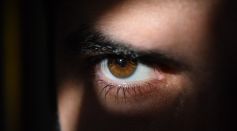Tags: Skin

Why Are There No Two Fingerprints Alike? New Study Reveals How These Intricate Patterns Are Made

Early Bird Fossils Reveal Mysteries About 'Paleontology Hotspot' Jehol Biota; Why Is This Ancient Ecosystem Important?

Grapes May Provide Photoprotection, Increase Sunburn Resistance, Protect the Skin Against UV Damage [STUDY]

Dark Circles Under the Eyes Could Be a Sign of Some Underlying Conditions, Expert Reveals

National Health Service Approves New Tablet To Treat Atopic Dermatitis to Those Unresponsive to Standard Eczema Treatments

Microscopic Mites Living in Human Skin Slowly Becoming Normal Part of Our Bodies; How Did They Evolve?

Living Skin for Robots Moves and Looks Human-Like

Psoriasis vs. Chronic Inflammation Psoriatic Arthritis: Here's What People Should Know About Them

Normal Appearing Skin of Lupus Patients Found Vulnerable to Rash, Changes Due to Genetics and Blood Activities

Roundworms Literally Slither Beneath Spanish Man’s Skin, Here’s What Doctors Say

World's Most Pierced Man Has 516 Body Modifications Including Hundreds on His Genitals; Is Body Piercing Safe?

Reversing Aging Process: Novel Scientific Method Made Skin Cells Look Younger by 30 Years!

Meghan Markle’s Favorite Beauty Product is Nicknamed “Botox in a Bottle”- And It’s Less Than $70 at Amazon

How to Prevent Rosacea Flareups? Tips to Avoid Triggers and Reduce Skin Redness

Atopic Dermatitis Prevention Tips: How to Avoid Eczema This Coming Winter

Wrinkles Due to Aging Can Be Determined From the Type of Pillow Someone Sleeps On, Which Type Can Help Reduce Them?
Why Do Fingers, Toes Prune Fast When Soaked in Water? Evolution May Have the Answer

Smartwatch Recharges Using Human Body? This New Technology Keeps Tracking Even When Asleep

E-Skin: World's First Smart Foam Robotic Arm Technology That Works Like Human Skin for Robots

Protect Your Skin from UV Rays Even When on Staycation, Experts Warn As Warmer Weather Is Expected to Peak This Week
Most Popular

Trump Administration Declares COVID-19 Likely Originated from Wuhan Lab Leak, Citing Scientific Evidence

Earth's Temporary Mini-Moon Found to Be of Lunar Origin

Say Goodbye to Dark Spots: The Science Behind Dark Spot Remover Creams





